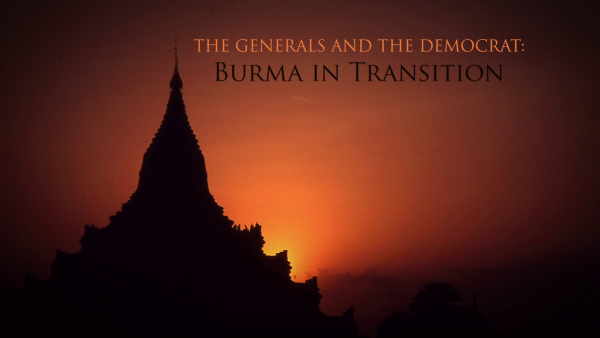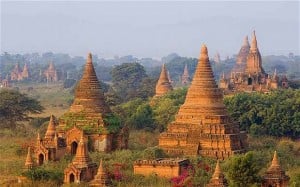
Last year I reported on the gradual opening of the political environment in Burma (last update here), including the incorporation of former dissident Aung San Suu Kyi’s opposition party National League of Democracy into parliament. The “Great Decisions in Foreign Policy” series on PBS — produced by Foreign Policy Association — has taken a look at this historic move toward democracy in an episode entitled “The Generals and the Democrat: Burma in Transition.” Here I present my thoughts on and reactions to this program (author’s note: while my blog is hosted by the FPA, the organization has not influenced the content of this post in any way; all comments are my own).
“Burma in Transition” takes on a challenging task: describe the past, present, and future of Burmese democracy (and lack thereof) in 30 minutes. Yet it presents a reasonable overview of the country’s political history since declaring independence from the U.K., recent and current movements away from dictatorship, roadblocks and challenges that lie ahead, and how U.S. policy can support Burma’s transition.
The episode does well to link the country’s economic situation to political developments. It is pointed out that expansion of democracy in Burma

Ancient city of Bagan. Burma. The nation is currently undergoing a gradual political opening, with hopes of economic investment (including tourism) following. The “Great Decisions” series focuses on the long-isolated nation in “The Generals and the Democrat: Burma in Transition.” Photo: photolibrary.com via telegraph.co.uk
did not result from a popular uprising as in the Arab Spring, but was a self-motivated change by the ruling dictatorship (at least partly) resulting from dire economic struggles. Also focused on is how efforts to improve and expand the country’s infrastructure are tied to the opening of the country to global trade and investment, which itself is tied to the extent of political openness and stability (the U.S. has eased some sanctions after recent reforms).
“Burma in Transition” also rightly elaborates on the political uncertainty that exists now and for the future, that democracy there is not a done deal. While democracy proponents joining parliament was a historic event, it remains to be seen how much influence they will have, or more to the point be allowed to have by the regime. As I previously pointed out, yes, the opposition is now part of the government, but that government is the same one that forced their leader into house arrest and brutally cracked down on dissent for decades. Hard to reconcile those positions.
While the government’s maltreatment of minorities is touched on in the episode, I feel this should have been given more attention. The government continues a brutal guerrilla war against Kachin rebels in Burma’s northern region. This seems the most prominent indication of the regime’s continued iron grip on power and intolerance of dissent, in spite of concessions elsewhere, and deserved to be a bigger part of the story as presented by “Great Decisions.”
Another aspect that didn’t sit right with me is the title itself, “The Generals and the Democrat,” with democrat being used in the singular and presumably referring to Aung San Suu Kyi. Yes she is a polarizing figure and the public face of Burma’s democracy movement. But she has repeatedly said that what is happening there is bigger than her, reflecting wishes of the people writ large. U.S. Ambassador to Burma Derek Mitchell confirms this in the episode. So is it right to title the program “the Democrat,” implying the transition concerns the work of a single person? I don’t think this is a trivial point. If democracy is to stick in Burma, well more than one person will be involved, important as that one person may be.
So overall “Burma in Transition” is informative and enlightening, though could use a few refinements. My hope is that it will make more people aware of what it going on in Burma, and how critical current transition period is to creating a free and stable Asian partner.